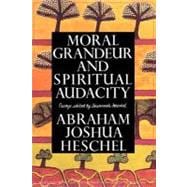
What is included with this book?
| Introduction | |
| To Be a Jew: What Is It? | p. 3 |
| The Moment at Sinai | p. 12 |
| Existence and Celebration | p. 18 |
| Hasidism as a New Approach to Torah | p. 33 |
| Israel as Memory | p. 40 |
| We Cannot Force People to Believe | p. 44 |
| A Time for Renewal | p. 47 |
| Pikuach Neshama: To Save a Soul | p. 54 |
| The Meaning of Repentance | p. 68 |
| On the Day of Hate | p. 71 |
| No Time for Neutrality | p. 75 |
| Symbolism and Jewish Faith | p. 80 |
| The Spirit of Jewish Prayer | p. 100 |
| Toward an Understanding of Halacha | p. 127 |
| Yom Kippur | p. 146 |
| Teaching Religion to American Jews | p. 148 |
| Jewish Theology | p. 154 |
| The Mystical Element in Judaism | p. 164 |
| A Preface to an Understanding of Revelation | p. 185 |
| God, Torah, and Israel | p. 191 |
| The Meaning of This War (World War II) | p. 209 |
| The Plight of Russian Jews | p. 213 |
| The Moral Dilemma of the Space Age | p. 216 |
| Required: A Moral Ombudsman | p. 219 |
| The Reasons for My Involvement in the Peace Movement | p. 224 |
| In Search of Exaltation | p. 227 |
| A Prayer for Peace | p. 230 |
| No Religion Is an Island | p. 235 |
| Choose Life! | p. 251 |
| On Prayer | p. 257 |
| The God of Israel and Christian Renewal | p. 268 |
| What Ecumenism Is | p. 286 |
| What We Might Do Together | p. 290 |
| Reinhold Niebuhr | p. 301 |
| An Analysis of Piety | p. 305 |
| The Holy Dimension | p. 318 |
| Faith | p. 328 |
| Prayer | p. 340 |
| The Biblical View of Reality | p. 354 |
| Death as Homecoming | p. 366 |
| App. Interview at Notre Dame | p. 381 |
| App. Carl Stern's Interview with Dr. Heschel | p. 395 |
| Notes | p. 413 |
| Sources | p. 423 |
| Acknowledgments | p. 427 |
| Table of Contents provided by Blackwell. All Rights Reserved. |
The New copy of this book will include any supplemental materials advertised. Please check the title of the book to determine if it should include any access cards, study guides, lab manuals, CDs, etc.
The Used, Rental and eBook copies of this book are not guaranteed to include any supplemental materials. Typically, only the book itself is included. This is true even if the title states it includes any access cards, study guides, lab manuals, CDs, etc.